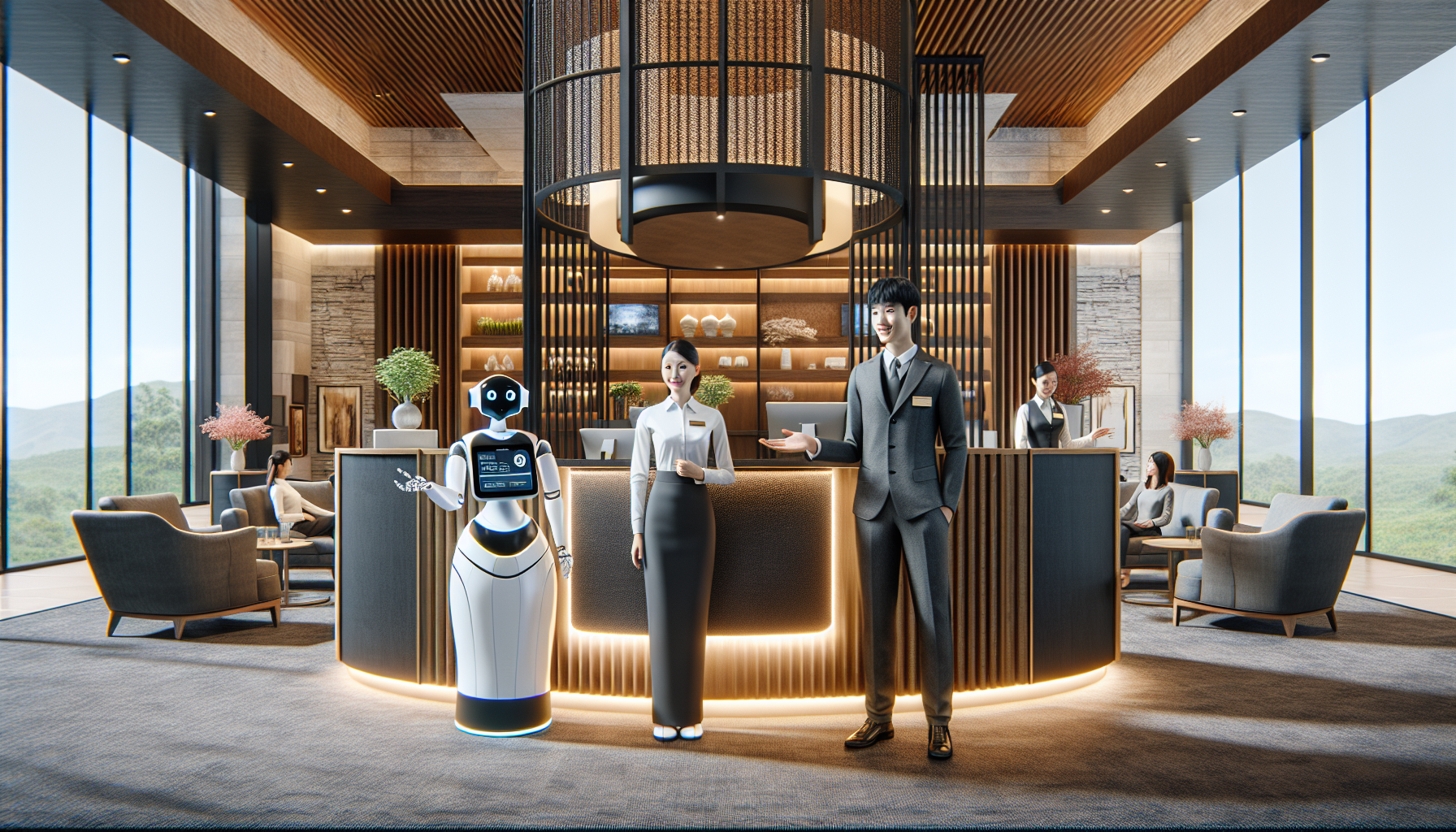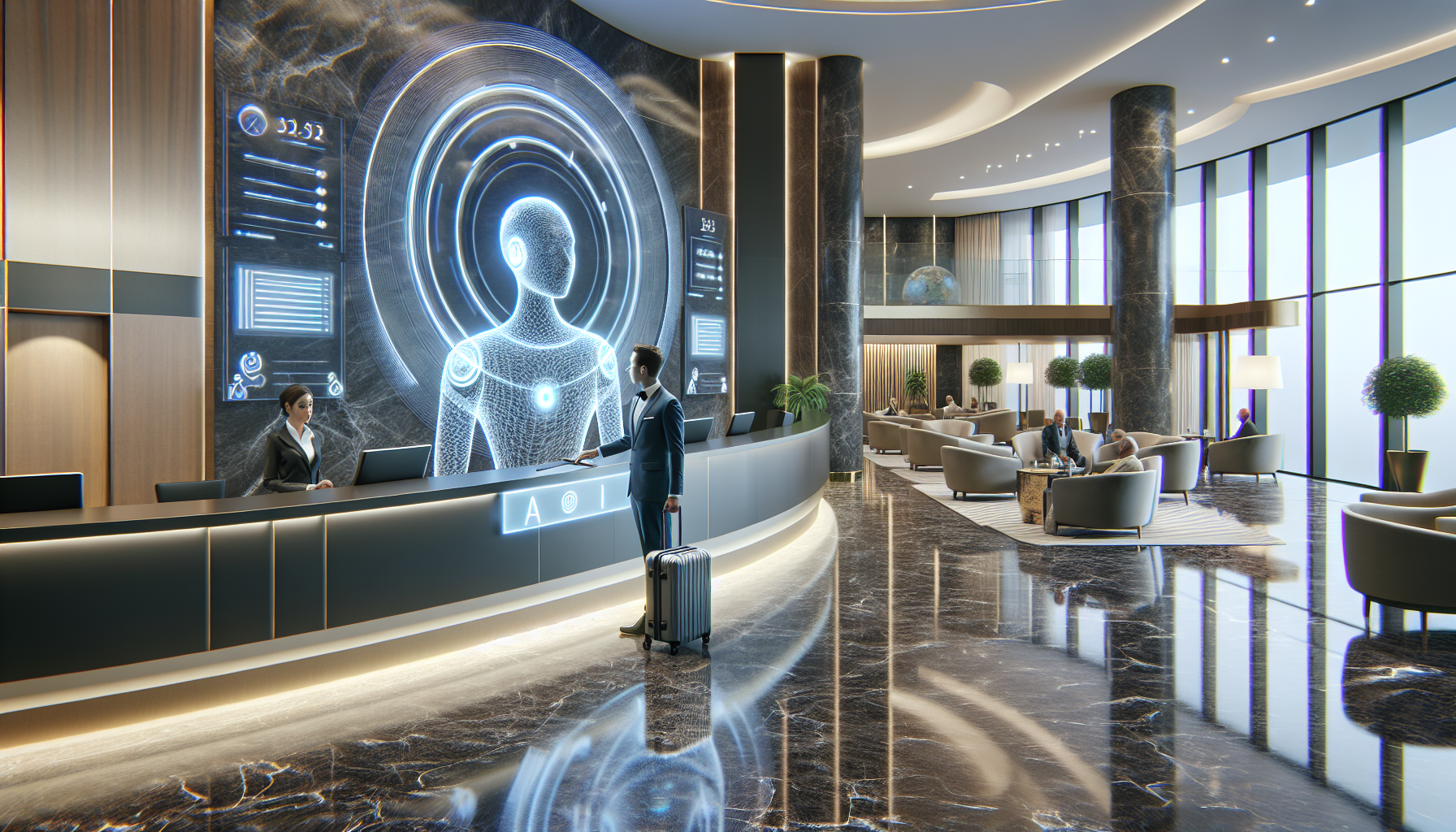
As we continue to usher in the age of digital transformation, the hospitality industry is not being left behind. In particular, the integration of Artificial Intelligence (AI) is steadily revolutionizing the hospitality landscape. Going beyond the typical use of AI-powered systems to automate back-end processes, the hospitality industry now embraces AI to directly interact with guests as virtual receptionists, collectively changing our understanding of the hotel experience.

The concept behind AI in hospitality revolves largely around enhancing guest experiences while maintaining operational efficiency. Through the deployment of AI-driven virtual receptionists, hotels and hospitality businesses can provide 24/7 customer support, delivering immediate responses to guests’ inquiries and requirements. With AI, guests enjoy a more streamlined and personalized service during their stay.
AI receptionists are equipped with sophisticated algorithms that enable them to process and interpret human speech, thereby engaging guests in natural-language conversations, managing bookings, and even learning from each guest interaction to continuously improve their service delivery. This application of AI takes into account the need for personalized guest service, presenting a fantastic opportunity for the industry to differentiate itself in a market where every detail of the guest experience is integral to success.
Further, the use of AI as a virtual receptionist greatly simplifies a hotel's operational processes, as these AI solutions can efficiently handle repetitive tasks, giving human personnel more time to focus on critical and creative tasks. By elevating the efficiency and agility of staff operations, automation and AI help drive the hotel’s bottom line while still fostering significant levels of guest satisfaction.
Indeed, the integration of AI into the hospitality industry signifies a transformational shift. It underscores the pivotal role technology plays in enhancing service efficiency and guest experiences in the era of digital hospitality. As AI receptionists become increasingly prevalent in the industry, it is clear that they are emerging as vital tools in facilitating unrivaled guest experiences while boosting operational efficiency.
At the forefront of hospitality innovation, AI Receptionists are revolutionizing the way hotels interact with their guests. AI Receptionists, also referred to as virtual concierges, offer an array of advanced features far beyond regular human capabilities. These game-changing features include 24/7 availability, multilingual support, and seamless integration with hotel management software - all geared towards enhancing guest experiences.
One of the most significant benefits of an AI Receptionist is its 24/7 availability. Even when the front desk is closed, AI Receptionists ensure that guests' needs and inquiries are promptly addressed. From checking-in late arriving guests, providing information on hotel services, to handling requests and complaints, the 24/7 presence of these virtual assistants allows hotels to offer a superior customer service experience.
Moreover, in an industry where communication is key, the ability of AI Receptionists to offer multilingual support cannot be overestimated. These intelligent systems are programmed to seamlessly converse in multiple languages, ensuring every guest feels welcomed and understood. By breaking down language barriers, AI Receptionists facilitate a smooth and personalized guest experience, irrespective of their linguistic background.
Another advantage of AI Receptionists is their ability to flawlessly integrate with various hotel management software. This includes reservation and booking systems, customer relationship management (CRM) tools, and even point of sale (POS) systems. Through intelligent integration, AI Receptionists not only streamline administrative tasks but also proactively personalize each guest's experience. From tracking guest preferences to offering customized recommendations, these smart tools ensure guests feel valued and catered to throughout their stay.
In conclusion, the advanced features of AI Receptionists infuse hospitality with the prowess of Artificial Intelligence, thus setting a new benchmark for guest experiences. Adopting such smart technologies is undoubtedly a wise investment for those in the hospitality industry keen on delivering personalized, efficient and high-quality services to their clients.
The hospitality industry is constantly evolving, aligning itself with technological advancements to improve and enhance the guest experience. Among the notable transformations in this sector is the presence of AI receptionists. These AI-powered tools provide intelligent, personalized service and fulfill special requests rapidly, leading to improved guest satisfaction.

A significant contribution of AI receptionists to the guest experience lies in their ability to offer intelligent communication. By leveraging machine learning algorithms, these advanced platforms can carry out conversations that are personalized to each guest. They are capable of going beyond scripted responses, engaging guests in dynamic conversations that enhance their stay.
Another crucial aspect of AI receptionists is their capacity for timely service. Unlike human receptionists, AI ones are available around the clock, leaving no room for delay or error. These digital assistance systems respond to queries and issues instantly, resulting in prompt service and customer satisfaction. Fast responses save guest time, allowing them to spend more on leisure or work-related activities.
Efficient handling of special requests adds to the appeal of AI receptionists. Whether it's a request for a specific type of room, a different breakfast menu, or some other special service, AI can process these requests swiftly and individually. The capacity to deliver personalized solutions enhances the guest's overall experience.
In this rapidly digitalizing world, the adoption of AI receptionists in the hospitality industry is a landmark move. These innovations benefit not only the guests but also the hoteliers by freeing up human resources for tasks that require more personal attention and deeper emotional intelligence.
With AI receptionists, the hospitality industry is poised for relevant, personalized, and efficient service set to redefine the guest experience.
The booming technology industry and increased operations through digital platforms have given rise to a significant trend in the hospitality market - AI Receptionists. The advent and subsequent embrace of these artificial intelligence powered virtual assistants have revolutionized the traditional guest service model, providing a range of operational benefits for hotels.
One of the key advantages offered by AI Receptionists is the reduction of labor costs. With the ability to handle multi-channel enquiries, bookings and other frontline tasks 24/7, hotels can minimize the need for a round-the-clock human workforce, without sacrificing its service levels. A study by McKinsey corroborates this, suggesting that AI can automate upwards of 45% of routine tasks previously handled by humans.
The use of AI Receptionists also contributes to improved response times, enhancing the overall guest experience. These virtual assistants are designed to process inquiries with lightning speed, therefore eliminating the long waiting times associated with a traditional reception desk. This not only improves customer satisfaction, but also bolsters hotel reputation, leading to an increase in repeat business.
Enhanced data management capabilities is another significant benefit. Unlike their human counterparts, AI Receptionists can easily sift through, analyse and manage vast amounts of data, enabling the hotel to offer more personalized services to its guests. A feature by IBM highlights this potential, demonstrating that AI's advanced data processing can help hotels anticipate customer needs, tailor services and optimize operations based on insightful analytics.
In summary, AI Receptionists are transforming the hospitality industry, eliminating inefficiencies in the traditional systems, and optimizing hotel operations. The shift towards automated reception services is not only beneficial from an operational standpoint but is also instrumental in improving guest experiences and retaining customer loyalty in a highly competitive market environment.
With the advent of AI technology, the hospitality industry is witnessing a remarkable transformation. A case in point is the implementation of AI receptionists in hotels, which are redefining guest experience while significantly enhancing operational efficiency. Let's delve into some compelling real-world applications and case studies?

The iconic Henn-na Hotel in Japan, touted as the world's first hotel staffed by robots, provides a fascinating insight into the possibilities ushered in by AI receptionists. From the moment guests step into the hotel, they are greeted by a dinosaur or a female humanoid robot that handles check-ins and check-outs. This distinctive approach has not only lured more tourists and tech-enthusiasts but also drastically reduced the hotel's labour costs.
On a similar note, Yotel, a high-tech hotel chain based in New York, employs YOBOT, a robotic luggage handler, and YotelPad, an AI-driven room control system. Both technologies have significantly enhanced guest satisfaction by offering an entertaining and seamless experience. According to reviews, guests have particularly appreciated the 24/7 accessibility of these AI systems, as it promotes a sense of convenience and personalization.
Riding the same wave, Conversational AI has also found its place in the hospitality sphere. For instance, Singapore's PARKROYAL Pickering uses a chatbot called PAIGE that assists guests post check-in. From answering guests' queries to room service requests, PAIGE is accessible round the clock, ensuring guests have a comfortable and personalized stay.
In conclusion, the successful implementation of AI receptionists in these hotels has amply demonstrated their ability to enhance guest satisfaction and improve operational metrics. These innovative uses of technology are ushering the hospitality industry into a new era where convenience, efficiency, and personalization are the benchmarks of a truly exceptional guest experience.
As we usher in the future of technology in the hospitality industry, there's no doubt that Artificial Intelligence (AI) has a crucial role to play. We are shifting from humans to AI Receptionists not only to streamline operations but also to enhance the guest experience.
One of the anticipated trends is the integration of AI receptionists with Customer Relationship Management (CRM) systems. This trend is set to revolutionize how hotels manage guest relations. AI-powered CRM systems can analyze past guest data and predict their needs, even before they voice them. This presents an opportunity for hotels to customize experiences to individual guest's preferences, from room temperature settings to food preferences. The end result is a more personalized, memorable stay that boosts customer loyalty.
We are also poised to see voice-controlled AI Receptionists, a natural progression from touch-screen interfaces. Guests may soon be able to use voice commands to control room features, make requests, or even seek recommendations for local attractions - all from the comfort of their room, with no human interaction necessary. Imagine a guest being able to say "increase the room temperature" or "recommend a local Italian restaurant" and the AI Receptionist responds immediately. Such advances will uphold the most desirable aspect of hospitality: convenience.
Lastly, we might witness the rise of emotionally intelligent AI Receptionists. Combining advances in machine learning and affective computing, AI could interpret guests' emotions and respond accordingly. For instance, if a guest were excited about their first visit to a city, the AI could suggest popular local attractions or events. Conversely, if the guest were stressed or tired, the AI could offer a later check-out time or recommend an in-house spa service. Such capability could, yet again, make the stay more personal and satisfying for every guest.
While these leaps in AI technology are enticing, it is crucial for the industry to strike a balance between tech-centered convenience and authentic human connection. The future of the hospitality industry will rely on blending the best of both worlds seamlessly.
In conclusion, the bright future of AI in Hospitality is on the horizon, promising a refined, personalized and swift hotel experience. And in this perpetual evolution of technology, guests stand as the ultimate beneficiaries.
Start your free trial for My AI Front Desk today, it takes minutes to setup!








